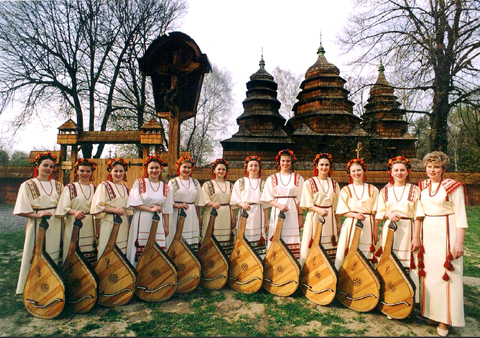Dressed in traditional Ukrainian Cossack attire, the all-female bandura ensemble Tcharivni Strouny will make its debut appearance in Taiwan on Wednesday. The group aims to introduce local audiences to the ancient plucked string instrument and a musical tradition that has been suppressed at various times through history.
The bandura combines elements of a lute and box zither, and its use dates back to the sixth century. From the 16th to 18th centuries the folk instrument underwent significant changes in the hands of Zaporozhian Cossacks who lived in Central Ukraine. The kobzar tradition was formed as Ukrainian itinerant Cossack bards popularized kobza music. The terms bandura and kobzar were interchangeable until the 20th century.
Sung to the accompaniment of the bandura, Tcharivni Strouny’s repertoire includes psalms, chants, folk songs and dumy, Ukrainian epics mainly concerned with historical events and religious beliefs.

PHOTO COURTESY OF TCHARIVNI STROUNY
It’s because of their association with aspects of Ukrainian history and religious elements that bandurists and kobzari were systematically persecuted by authorities that once occupied the region, especially during Stalin’s purges of the 1930s.
Today, the bandura is taught at the nation’s major conservatories and ensembles have become increasingly popular both at home and abroad, including Tcharivni Strouny — Magic Strings & Voices. Founded by Iryna Sodomora in 1973, the award-winning group has participated in numerous national and international competitions, and performed across the globe from Croatia, Hungary, France to Canada and the US.
For Tcharivni Strouny’s Taiwan performances, conductor and lead soloist Sodomora will lead 12 bandura players and singers aged between 15 and 22 as well as violin and flute players. The bill includes a colorful mix of Western classical music from the likes of Mozart, and contemporary compositions by Ukrainian bandura artists and traditional songs.
Instead of dealing with the weighty subjects of history and religion, the folk melodies mainly address romances between beautiful girls and young men, laments for lost love as well as a husband’s complaints about his fastidious mother-in-law.

April 28 to May 4 During the Japanese colonial era, a city’s “first” high school typically served Japanese students, while Taiwanese attended the “second” high school. Only in Taichung was this reversed. That’s because when Taichung First High School opened its doors on May 1, 1915 to serve Taiwanese students who were previously barred from secondary education, it was the only high school in town. Former principal Hideo Azukisawa threatened to quit when the government in 1922 attempted to transfer the “first” designation to a new local high school for Japanese students, leading to this unusual situation. Prior to the Taichung First

When the South Vietnamese capital of Saigon fell to the North Vietnamese forces 50 years ago this week, it prompted a mass exodus of some 2 million people — hundreds of thousands fleeing perilously on small boats across open water to escape the communist regime. Many ultimately settled in Southern California’s Orange County in an area now known as “Little Saigon,” not far from Marine Corps Base Camp Pendleton, where the first refugees were airlifted upon reaching the US. The diaspora now also has significant populations in Virginia, Texas and Washington state, as well as in countries including France and Australia.

On April 17, Chinese Nationalist Party (KMT) Chairman Eric Chu (朱立倫) launched a bold campaign to revive and revitalize the KMT base by calling for an impromptu rally at the Taipei prosecutor’s offices to protest recent arrests of KMT recall campaigners over allegations of forgery and fraud involving signatures of dead voters. The protest had no time to apply for permits and was illegal, but that played into the sense of opposition grievance at alleged weaponization of the judiciary by the Democratic Progressive Party (DPP) to “annihilate” the opposition parties. Blamed for faltering recall campaigns and faced with a KMT chair

Article 2 of the Additional Articles of the Constitution of the Republic of China (中華民國憲法增修條文) stipulates that upon a vote of no confidence in the premier, the president can dissolve the legislature within 10 days. If the legislature is dissolved, a new legislative election must be held within 60 days, and the legislators’ terms will then be reckoned from that election. Two weeks ago Taipei Mayor Chiang Wan-an (蔣萬安) of the Chinese Nationalist Party (KMT) proposed that the legislature hold a vote of no confidence in the premier and dare the president to dissolve the legislature. The legislature is currently controlled